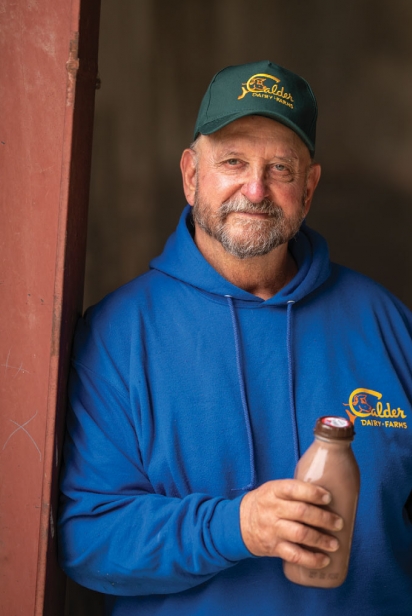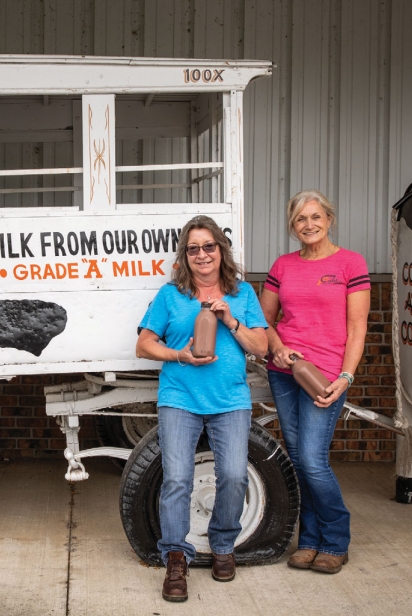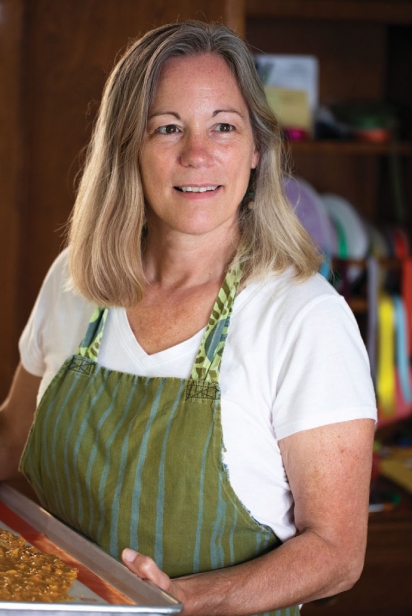Food Memories
LOOKING BACK ON THE PEOPLE & PLACES OF EDIBLEWOW’S PREMIERE ISSUE
For Robb and Kate Harper, edibleWOW was supposed to be a five-year retirement plan. And in the beginning, it wasn’t easy.
“When we launched in January of 2008, the economy went into the toilet,” says Robb, who worked in the mortgage industry before switching careers. But 13 years later, “we are still loving the people that we meet and the stories that we’ve written.” And, Kate adds, “the food we get to eat!”
In recent years Kate has stepped away to attend to family matters. Robb is staying on for a year as the reins are handed over to the next generation: chefs Jeremy Abbey and John Piazza, the executive director and executive director of business development of Soil2Service.
“It was truly a passion,” says Robb, “but it was time to pass the baton.”
Over the years the local food scene in Southeast Michigan has changed and evolved. For Kate, the most impactful stories are about those who grow our food.
“I love the stories of the farmers and engaging people and getting to know them, and going to the farm,” Kate says.
Robb adds, “I’d like to think that we have made a large impact on the agricultural community in southeastern Michigan.”
Robb also notes the growth of young food entrepreneurs (young in the age of the business, not necessarily age in life) has had a tremendous impact on the options consumers have and showcasing Michigan.
With their passion and dedication, the entrepreneurs have brought their food products “to the attention of big-box stores that are now [offering] local. You see Amazon [and stores like Whole Foods], where they have Michigan sections.”
And they’ve come to know those entrepreneurs. “We know High 5 Salts. We know Beau Bien Foods and Gus & Grey. … We take great pride in the relationships that we’ve built over the past 13 years.”
Stories of farmers and entrepreneurs were well represented in edibleWOW’s first issue. Fittingly enough, edibleWOW’s original cover story was about Calder Dairy, a local and beloved family farm that has endured over the years. There were stories that featured staples of the local food community, from a chocolate maker to a future James Beard Award–winning chef.
In honor of edibleWOW’s golden milestone of 50 issues, we took a trip down Memory Lane to revisit some of the stories and people who appeared in the premiere issue to see where they are now, how consumers’ appreciation for food has grown and what these food leaders foresee for their businesses.
A FAMILY FARM ENDURES
When John Calder was 11, he was driving a Divco delivery truck through a subdivision but had a driving mishap with the combination clutch/brake pedal, he recalls with a laugh on an early September afternoon outside Calder Dairy’s Flat Rock store.
“My dad told me I was done for the day,” he says.
Fortunately for him and for Calder’s customers, it was just a day. Today John Calder is still very much a part of the family business that his father started in 1946 in Carleton (and it still makes home deliveries). Spanning 100 acres, the Carleton farm is home to 165 milk cows, aka “the girls,” and hosts visitors who want to learn more about where their milk comes from. The dairy also operates two retail locations, one in Lincoln Park and another in Flat Rock, which opened in 2017.
And while there have been technological advances (no more ice chips to keep things cold), Calder Dairy is still very much rooted in tradition, such as the glass jars that the milk comes in. That glass jar was edibleWOW’s “cover model” for the first issue.)
Running a dairy business is not for the faint of heart. Calder can remember when there were four different dairy farms on the same road in Monroe County and now there are only two left in the entire county.
Even though the ranks of dairy farms have dramatically decreased since Calder Dairy was founded, he credits Calder’s longevity to its dedication to quality and its loyal customers and employees, who are just as much a part of the Calder family.
“What kept us going [over the years] is that we didn’t deviate from quality,” he says. “When something is done right, you don’t change it.”
In 2017, Calder Dairy added its Flat Rock store but John Calder doesn’t foresee much expansion beyond that because he is dedicated to the idea that the family business stays a craft dairy. Calder Dairy churns out 140,000 quarts of milk a month, which sounds like a lot but is nothing compared to bigger operations, he says. But that’s just fine with him.
“There is no big need for largeness to be a prerequisite of good,” says Calder. “We want to stay a craft dairy and continue to give consumers a quality product to drink.”
THE ROLE OF A CHEF
As a chef, Alex Young has always been interested in agriculture but it wasn’t until his son was in fifth grade that he became more engaged in food and farming, which deepened his lifelong love and passion for food.
“The impetus for me getting involved in agricultural activism was going to school lunch with my son,” says Young. “I got interested in [the food students ate] and farming simultaneously as a way to learn more about food because I love food. I’ve always loved food and how it’s made.”
He also got more interested in the people involved because “you can’t mistreat people and have good food.”
That interest in the interdependence of people in the community who care deeply about food has been a guiding principle for Young over the course of his culinary career.
In 2008, Young was chef and managing partner of Zingerman’s Roadhouse, which opened in 2003. Around the same time he also started gardening. What started as a small family garden eventually grew to 40 acres at Cornman Farms, which opened in 2014.
Nominated four years in a row for a James Beard Award before garnering the coveted prize on the fifth nomination in 2011, Young beat out four chefs from Chicago, who would all go on to earn Michelin stars for their respective restaurants that ranged from white-tablecloth fine dining to avant garde molecular gastronomy.
“It was an honor especially for not having a particularly fancy restaurant,” says Young, who traveled with his family to New Jersey in a motorhome before commuting into the city to accept the award.
Young left Zingerman’s Roadhouse to open Standard Bistro & Larder, a high-end French restaurant, in 2017. The partnership didn’t work out, he says, and he eventually moved on to take the helm at Vinology earlier this year. As a chef who is always looking to evolve, he’s embracing the new challenge.
“It’s an opportunity for me because vinology is the study of wine and it’s a wine restaurant that specializes in that,” he says. “For me, my studies and experiences have been pretty wide in terms of Old World and New World. … It’s an opportunity for me to do what I love to do.”
Young is among many chefs in Southeast Michigan who practice what they preach, making local food a priority and demonstrating that what we eat is a reflection of our values. Several of those chefs who embrace that ethos were featured in edibleWOW’s “The Role of a Chef” article published in 2008.
SWEET SPOT
In 2010, Michigan passed the Cottage Food Law, which allowed people to make food for sale at farmers’ markets and other events out of their homes and fostered the growth of food entrepreneurs in the area who had a great recipe and passion for food.
But Nancy Biehn was making chocolates way before that. Biehn grew up on a farm in Wisconsin, where she learned to love and appreciate locally grown fruits and vegetables at an early age. But it wasn’t until she worked as an au pair in Spain in the ’90s that she embraced a love for chocolate. Her eyes were opened by a trip to a chocolate shop that resembled a jewelry store more than a candy store.
“I just loved all the variety of how they could use chocolate to make something that looks so unique and tasted so interesting,” she says. But it wasn’t so much the flavors (they were all very good but she didn’t understand many of the words since it was in Spanish). “It was more like how they elevated this food product to this really fancy higher level visually.”
And that starts with quality ingredients. “Cacao is this natural product that tastes best when it’s grown in small batches and single origins … grown in places that are not mass produced,” she says, adding “they have these flavors that are so much more interesting than commodity-market chocolates. And so combining those single-source chocolates with locally sourced flavors, I was able to really elevate that idea.”
That led to Sweet Gem Confections, which she founded in 1997 in Ann Arbor. There was no Cottage Food Law at the time, and that propelled her to create a commercial kitchen because it wasn’t practical to keep hauling chocolate and equipment around town. She built a commercial kitchen at the Morgan & York gourmet shop, where she operated in 2012 until she lost her lease.
“[Sweet Gem Confections] was a successful business for a long time. But the financial part was always a struggle,” she says.
Now she’s come full circle. About two years ago started working full time so Sweet Gem Confections is more of a side hustle these days (she’s converted her dining room into a chocolate kitchen) when Biehn fulfills special orders or does holiday sale events. But whenever she wants to make chocolate, she says she knows it won’t go to waste thanks to her loyal customer base. She’s also expanded beyond chocolate, experimenting with other types of sweet treats such as pâte de fruit (fruit jellies).
Biehn notes in the past few years she’s noticed a lot more people “who are following their passions and taking risks and making choices to have businesses based not necessarily on just great profit margins.” At the same time, there are customers willing to pay for high-quality products.
“I think, in Ann Arbor especially, people really value the locally sourced ingredients,” she says.
“I really appreciate the way a lot of local businesses have been able to educate the public and especially in Ann Arbor. I always give a lot of credit to Ari [Weinzweig] and Paul [Saginaw] at Zingerman’s. I think that if they had they not done what they did in Ann Arbor my business never wouldn’t have been as successful as it was. They raised the bar, and they were able to tell the stories about food and then give the service and make the connection with their customers. All of that leads to really great value for local makers.”
Biehn was one of edibleWOW’s featured Notables in 2008.









